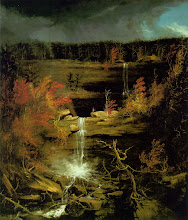Bourriaud writes of “relational aesthetics,” describing how modern art (1990s) is more about improving human relationships than about expressing absolutes or “creating utopias” (46). Art in the 1990s, he claims, changes the relationship between time and space, much like atomic particles. Thus, the audience helps create the relationship along with the artist. Form has become more diversified, while time has become more specific, making art more concerned with the ordinary world, but more like rendevous. To Bourriaud, this means that relational art cannot be as easily commodified as art in the past, which is important in an increasingly powerful global economy.
Links: Like Eagleton, Bourriaud relates art to a commodity culture. I thought this went back to Marx, Benjamin, Marcuse, Adorno, Williams. The post industrial revolution thinkers write increasingly of the relationship between art and capitalism. However, I also remember the Roman authors describing Roman culture as more superficial and greedy than that of the Greeks. So perhaps fear of “selling out” didn’t arise in 1980s punk scene but in the ancient Roman art scene.
The description of art as a relationship reminds me most of Williams and Hegel. Hegel describes it as a reconciliation between the divine within and without. Bourriaud isn’t describing a relationship with the divine, but between the artist and audience, mediated by time and space.
Question: I found this work very interesting. I especially enjoyed his descriptions of actual works. Bourriaud states that these works are knowingly specific and temporary and that those qualities shouldn’t lessen their relevance. I’m not sure what my point is here, but I find it difficult to discover the relevance of a work of art ( or my understanding of it) without reflection. Here, it seems like reflecting more on an experience than on a work of art. Will art that is more like a subjective memory last? He says that’s not the point, but how else do we discover relevance?
I especially liked his point early on about human relations no longer being “directly experienced” (9). I read this just before going to a two year old’s birthday party where I felt guilty for being the only parent not filming my sons finding easter eggs. I often like those fuzzy, did it really happen memories not predetermined by photographs.
Subscribe to:
Post Comments (Atom)
.jpg)
.jpg)
.jpg)
No comments:
Post a Comment